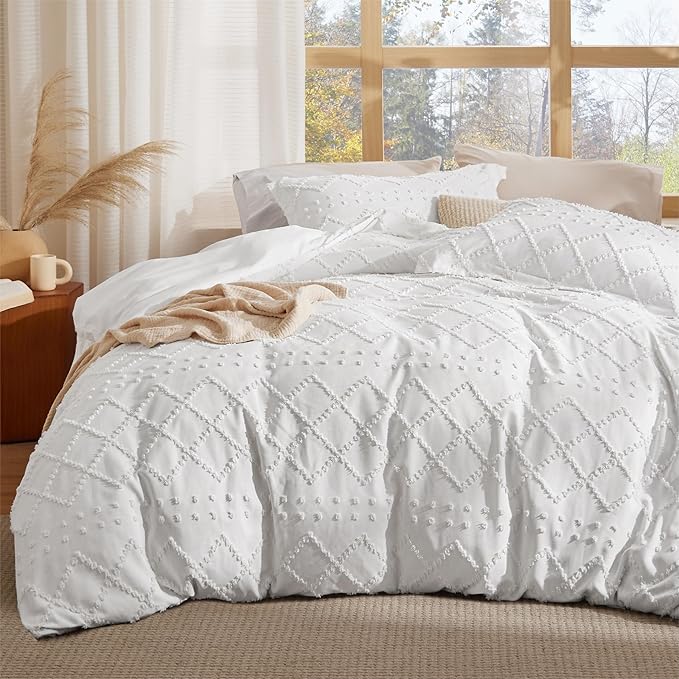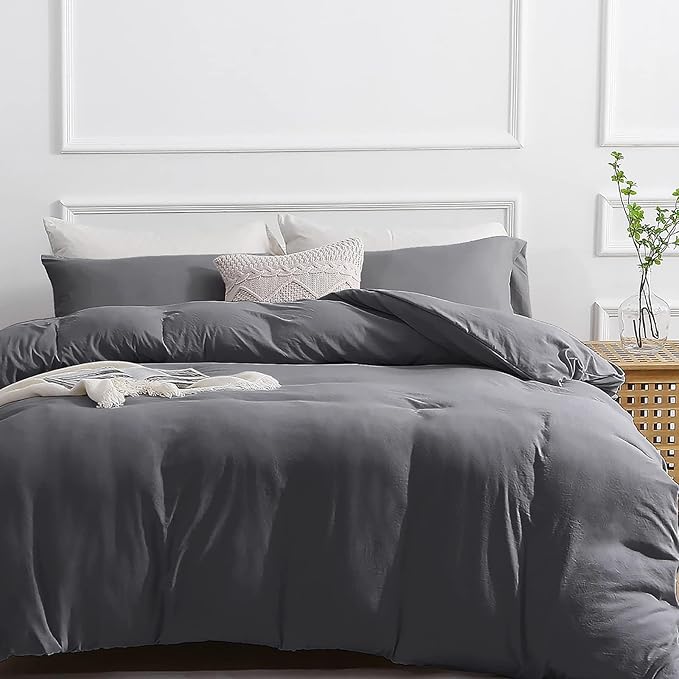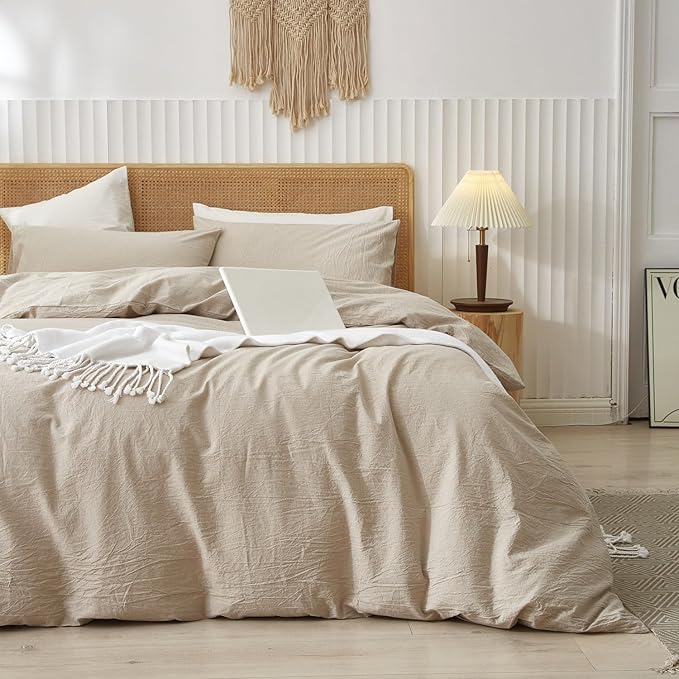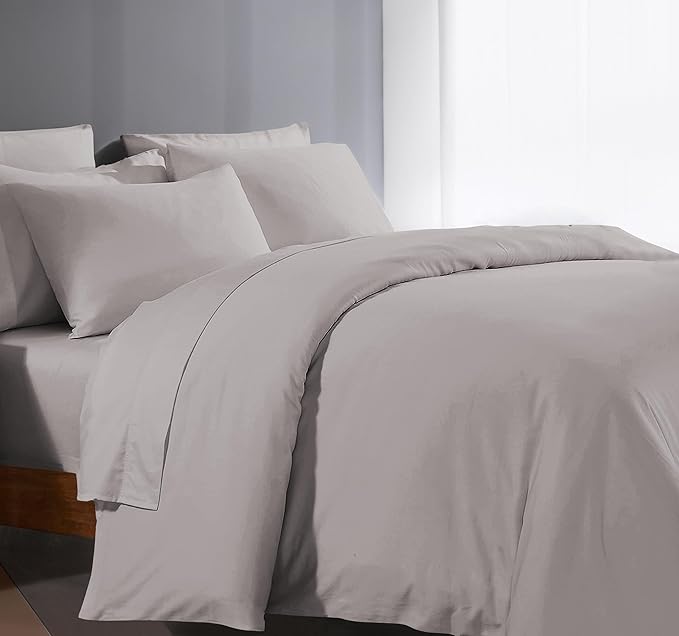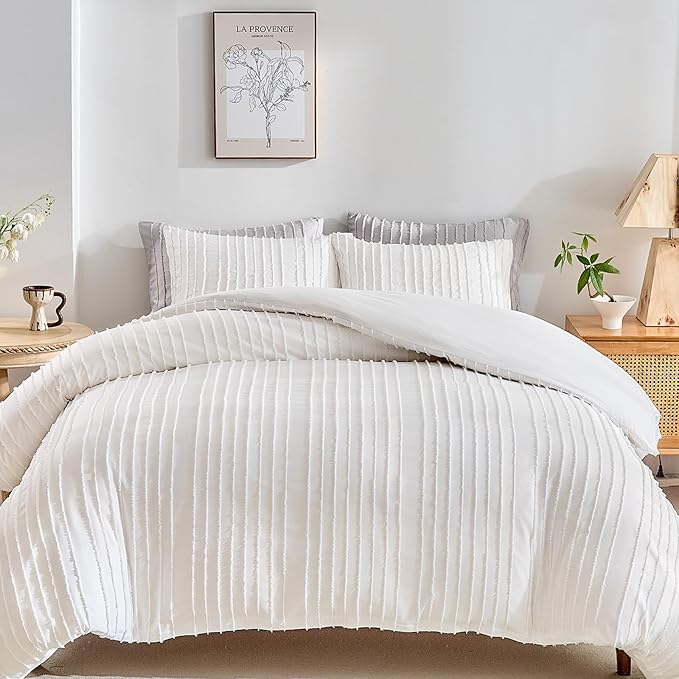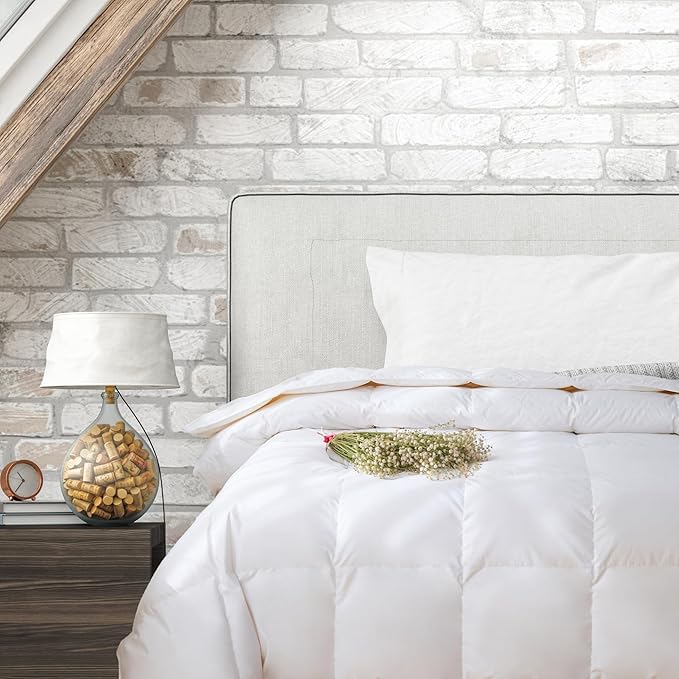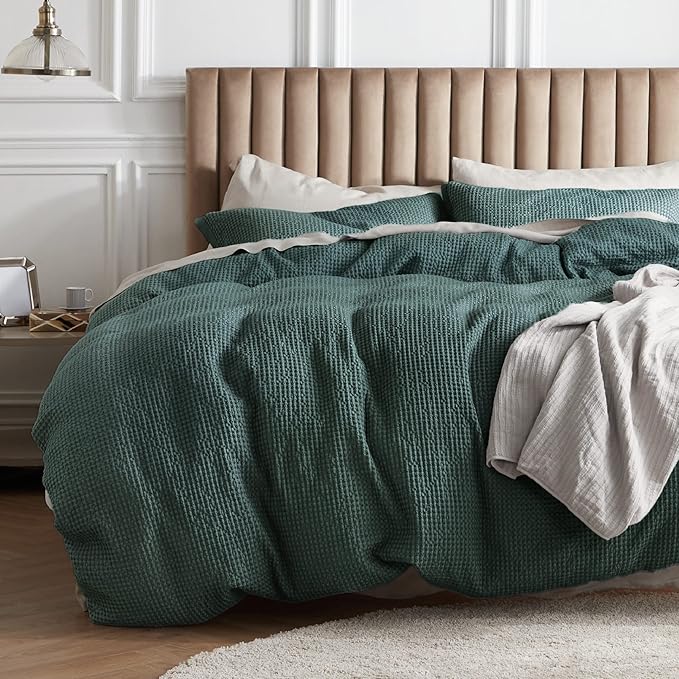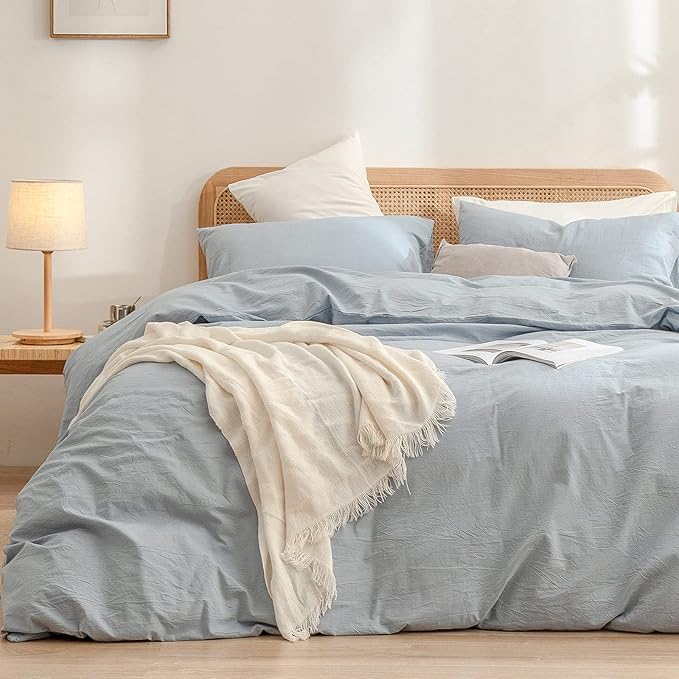
A good night’s sleep is key to feeling well. The right duvet can make a big difference. With many choices, picking the best can be hard. This article will look at the top 3 duvets for the best sleep, focusing on comfort and quality.
When looking for duvet comfort, several things matter. These include fill type, tog rating, and material quality. We’ll cover these and more, helping you choose the best duvet. You’ll find the perfect mix of comfort, quality, and value among the top 3 options.
Looking for a duvet for cold winters or cool summers? We’ve got you covered. Our aim is to help you find the ideal duvet. This ensures you get the best sleep possible.
Key Takeaways
- Investing in a high-quality duvet can significantly improve sleep quality
- Duvet comfort is crucial for a good night’s sleep
- The top 3 duvet options offer a range of benefits, including comfort, quality, and value
- Fill type, tog rating, and material quality are essential factors to consider when choosing a duvet
- A good duvet can provide the perfect combination of warmth and coolness for different seasons
- Choosing the right duvet can have a significant impact on overall well-being
Understanding Duvet Basics and Their Importance
A good night’s sleep starts with a quality duvet. It’s more than bedding; it’s an investment in comfort and well-being. To pick the right duvet, you need to know about duvet quality and materials. The fill power, material, and construction all matter.
The fill type is key to duvet quality. Down duvets are light and warm, while synthetic ones are cheaper and good for allergies. The material also affects breathability, softness, and comfort.
What Makes a Quality Duvet
A quality duvet offers warmth, comfort, and lasts long. Look for duvets with high-quality materials like cotton or bamboo. The tog rating shows the duvet’s warmth and thickness. A higher tog means it’s warmer, a lower one means it’s lighter.
Different Fill Types Explained
Knowing about fill types helps you choose the right duvet. Here are some common ones:
- Down: Known for its lightness and warmth, down is a popular fill type for duvets.
- Synthetic: Synthetic fills are often more affordable and hypoallergenic than down.
- Wool: Wool-filled duvets are breathable, soft, and warm, making them a great choice for those who tend to sleep hot.
Understanding Tog Ratings
Tog ratings measure a duvet’s warmth and thickness. The higher the rating, the warmer the duvet. Think about the tog rating when choosing a duvet for your comfort and sleep.
Key Factors in Choosing the Perfect Duvet
Choosing the right duvet involves several important factors. Price is a big deal, as prices vary by brand, quality, and materials. It’s smart to compare prices from different brands to get the best deal.
The brand you choose is also key. Top brands offer quality duvets that are comfy and last long. Look for brands with a variety of options for different budgets and tastes. In Canada, many duvet brands offer everything from affordable to luxury choices.
Here are some key factors to consider when choosing a duvet:
- Material: Choose duvets made from breathable, natural materials like cotton or bamboo.
- Fill type: Pick between down, synthetic, or wool-filled duvets based on your preferences and needs.
- Tog rating: Select a duvet with a tog rating that matches your climate and personal temperature preferences.
By thinking about these factors and researching different duvet brands, you can make a smart choice. Make sure to check duvet prices and compare them across brands to find the best value.
The Top 3 Duvet Options for Canadian Homes
Canadians have many duvet options to choose from. We’ll look at the top 3 duvets for Canadian homes. These include premium down duvets, synthetic alternatives, and wool-filled duvets. We’ll discuss their features, benefits, and prices.
Choosing the right duvet is key for comfort. The top 3 duvets offer warmth, breathability, and durability. Whether you like down’s luxury or synthetic’s eco-friendliness, there’s a duvet for you.
Premium Down Duvet Analysis
Premium down duvets are warm and light. They use high-quality down feathers for great insulation. They ensure a cozy and restful sleep.
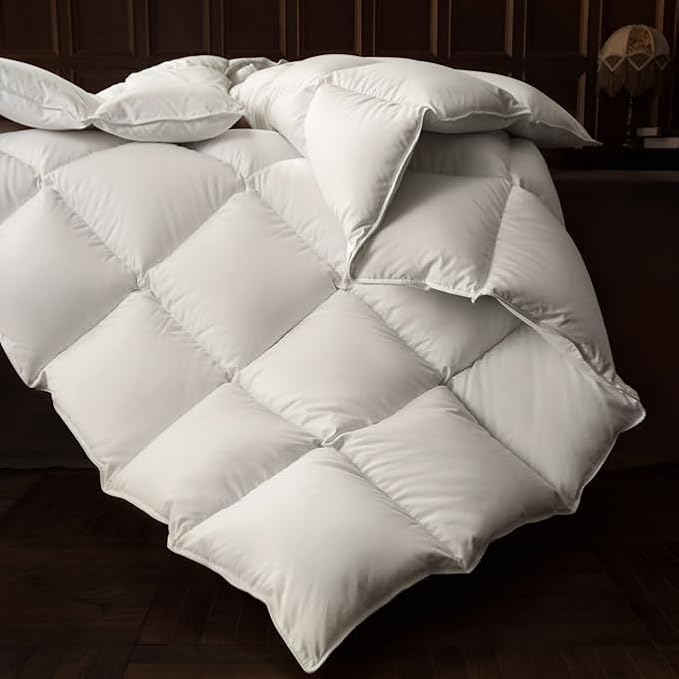
Synthetic Alternative Excellence
Synthetic duvets are warm and durable at a good price. They use synthetic materials that feel like down. They’re perfect for those who want a hypoallergenic option.
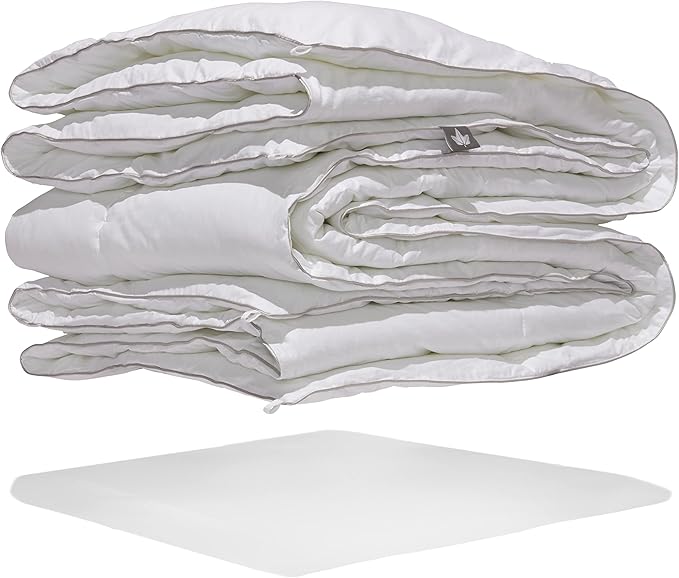
Wool-Filled Innovation
Wool-filled duvets are popular in Canada. They’re breathable, regulate temperature, and are eco-friendly. Natural wool provides insulation and wicks away moisture, ideal for those who sleep hot or cold.
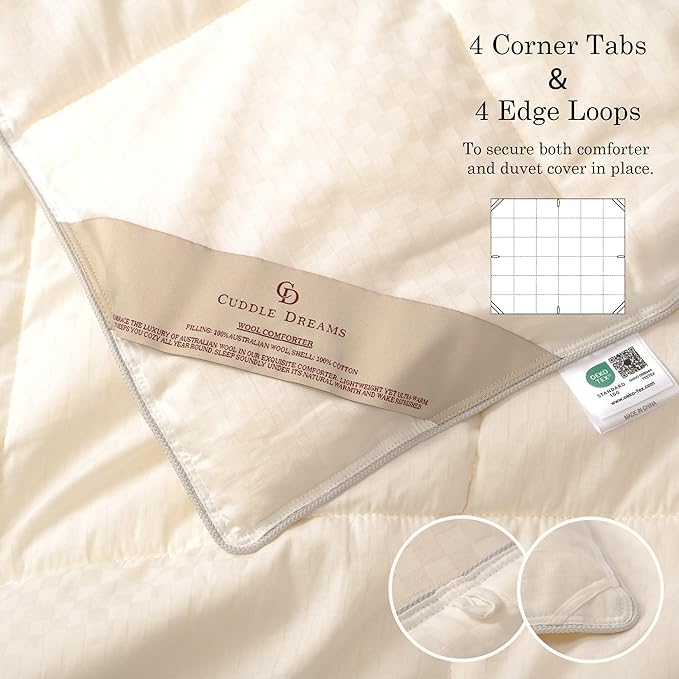
| Duvet Option | Fill Material | Price Range |
|---|---|---|
| Premium Down Duvet | Down Feathers | $100-$300 |
| Synthetic Alternative | Synthetic Materials | $50-$200 |
| Wool-Filled Duvet | Natural Wool | $150-$400 |
Material Quality and Construction Features
The quality of a duvet’s filling and construction is key to its comfort and durability. The filling type, like down, synthetic, or wool, affects warmth and loft. For example, down duvets are great at keeping warm, while synthetic ones are cheaper and good for allergies.
The duvet’s construction, including stitching and filling, also matters. A well-made duvet stays comfortable longer. Look for materials that breathe, are soft, and last long. Egyptian cotton, bamboo, and silk are top choices for their quality and comfort.
Here are important things to think about when checking a duvet’s quality:
- Fill power and fill weight
- Thread count and weave
- Stitching and seam construction
- Material breathability and moisture-wicking properties
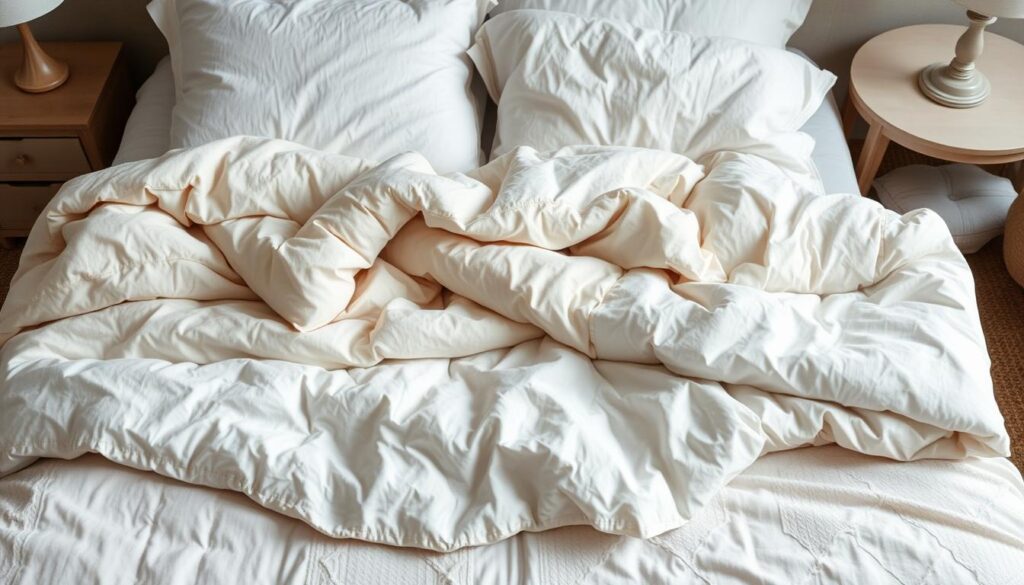
Choosing a duvet with good materials and construction means better sleep. Whether you like the warmth of down or the softness of synthetic, there’s a duvet for everyone.
| Duvet Material | Fill Power | Thread Count |
|---|---|---|
| Down | 500-800 | 200-400 |
| Synthetic | 300-600 | 150-300 |
| Wool | 400-700 | 250-350 |
Temperature Regulation and Seasonal Adaptability
Temperature regulation is key for duvet comfort. A duvet that adjusts to seasons is vital for sleep. In winter, a high tog duvet keeps you warm. In summer, a lighter duvet with a lower tog rating is better.
For the best duvet comfort, think about temperature control. Choose a duvet with fillings like down or synthetic insulation. Also, a breathable cover helps keep you cool in summer and warm in winter.
Winter Warmth Requirements
In winter, a duvet with a high tog rating is needed. A tog rating of 10-13 is best for cold nights. Down, wool, and synthetic insulation are good choices for winter duvets.
Summer Cooling Solutions
In summer, a lighter duvet with a lower tog rating is better. A tog rating of 2-4 is ideal for warm nights. Cotton, bamboo, and silk are popular for summer duvets.
All-Season Versatility
An all-season duvet is essential for comfort. A medium tog duvet works for both winter warmth and summer coolness. Down, synthetic insulation, and wool are good for all-season duvets.
| Season | Tog Rating | Filling Options |
|---|---|---|
| Winter | 10-13 | Down, Wool, Synthetic Insulation |
| Summer | 2-4 | Cotton, Bamboo, Silk |
| All-Season | 5-7 | Down, Synthetic Insulation, Wool |
Durability and Longevity Considerations
Choosing a duvet means looking at duvet quality and durability. A good duvet lasts for years, keeping you warm and comfortable. But a bad one loses shape and warmth fast.
For a duvet that lasts, check for tight stitching and secure filling. These keep the filling in place, so your duvet stays warm.
Construction Quality Markers
- Tight stitching to prevent filling from escaping
- Secure filling to maintain duvet’s shape and insulating properties
- High-quality materials to ensure durability and resistance to wear and tear
Expected Lifespan
A quality duvet can last 5-7 years with the right care. Some may last longer, others shorter, based on how you use it.
Thinking about duvet quality and durability helps you choose wisely. You’ll get a duvet that keeps you warm and comfortable for years.
| Duvet Type | Expected Lifespan |
|---|---|
| Down-filled duvet | 5-7 years |
| Synthetic-filled duvet | 3-5 years |
| Wool-filled duvet | 7-10 years |
Care and Maintenance Guidelines
To keep your duvet in top shape, it’s key to follow the right duvet care and maintenance steps. Washing, drying, and storing it properly can make it last longer. For example, washing your duvet every 3-6 months can get rid of dirt, dust, and allergens.
Here are some tips for duvet care and maintenance:
- Check the care label to ensure you’re using the recommended washing and drying methods.
- Use a mild detergent and cold water to prevent damage to the duvet’s filling and fabric.
- Avoid over-drying, as this can cause the filling to become flat and lumpy.
- Store your duvet in a cool, dry place to prevent moisture buildup and damage.
By sticking to these easy duvet care and maintenance tips, you can keep your duvet clean and fresh. Always check the care label and follow the manufacturer’s advice for the best duvet care and maintenance.
Price Range Analysis and Value Assessment
When you’re looking to buy a duvet, duvet prices can really vary. It’s important to do a good value assessment to make sure you’re getting a good deal. In Canada, duvets can cost anywhere from under $50 for a basic one to over $200 for a high-quality one.
The value of a duvet depends on its fill power, material, and how it’s made. For example, a duvet filled with down or wool will cost more than one with synthetic materials. But, these natural fills offer better insulation and breathability, which might be worth the extra cost for many people.

Here are some important things to think about when looking at duvet prices and doing a value assessment:
- Fill power and material: Natural fills like down and wool tend to be more expensive than synthetic fills.
- Construction quality: A well-made duvet with a high-quality cover and sturdy stitching will generally be more durable and long-lasting.
- Brand reputation: Established brands with a reputation for quality may charge more for their products, but often offer better warranties and customer support.
By looking at these factors and doing a thorough value assessment, you can choose the duvet that offers the best value. This means considering both the upfront cost and the long-term benefits of your purchase.
My Selection
Environmental Impact and Sustainability
Choosing a duvet means thinking about its environmental impact. Many duvets use materials like down feathers from factory-farmed geese and ducks. On the other hand, some duvets are made from sustainable materials like recycled polyester or natural fibers like cotton and wool.
The way a duvet is made also matters for sustainability. Some makers focus on environmental impact by using less water and energy. They also make duvets that can be recycled, cutting down on waste and the need for new materials.
- Look for duvets made from recycled or natural materials
- Choose duvets with eco-friendly production methods
- Consider the duvet’s recyclability and end-of-life disposal
By thinking about the environmental impact of your duvet, you can make a better choice. This choice reflects your values and helps create a more sustainable future.
Canadian Climate Considerations and Recommendations
Choosing the right duvet is key when you know the Canadian climate. The country’s wide range of climates means different duvets are needed. Quebec’s cold winters and British Columbia’s mild temperatures are just examples.
Canada’s climate can be broken down into four main types: cold, moderate, mild, and coastal. Each type needs a specific duvet. For example, in cold areas, a duvet with a higher tog rating is best. In milder areas, a lighter duvet works better.
Regional Climate Adaptations
Adapting to your region’s climate is important when picking a duvet. Here’s a table showing the best duvet tog ratings for different parts of Canada:
| Region | Recommended Tog Rating |
|---|---|
| Quebec and Ontario | 10-13.5 tog |
| British Columbia and Alberta | 7-10.5 tog |
| Maritime Provinces | 10-13.5 tog |
Seasonal Selection Guide
Using a seasonal guide can help you pick the right duvet. Think about these factors:
- Winter: Choose a duvet with a higher tog rating (10-13.5) for cold areas.
- Summer: Go for a lighter duvet (4-7 tog) in milder climates.
- Spring and Autumn: Pick a duvet with a medium tog rating (7-10.5) for moderate areas.
Conclusion: Making Your Final Duvet Selection
Choosing the right duvet for your Canadian home is a big decision. You need to think about many things. This includes the duvet’s material, how well it keeps you warm or cool, and how long it lasts.
The duvet that’s best for you should be comfortable, high-quality, and good value. You might choose a duvet filled with down, a synthetic one, or one made of wool. Make sure it fits your needs, the weather, and your budget.
With the advice from this guide, you can pick a duvet that will make your sleep better for years. Start your search for the perfect duvet and make your bedroom a cozy retreat.
